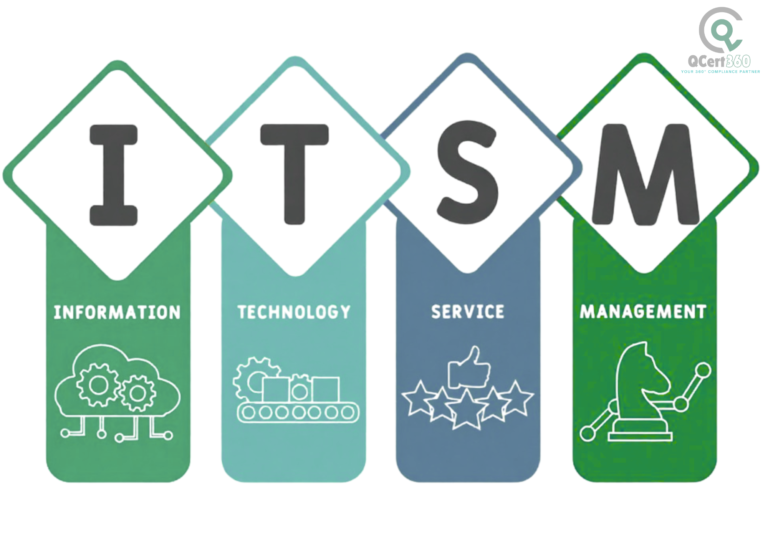
If you run or manage IT services, you already know the pressures: clients expect reliability, fast response, seamless integrations, and zero downtime. Delivering this consistently is challenging without a structured framework. That’s where ISO 20000-1 comes in.
ISO 20000-1 is the international standard for IT Service Management (ITSM), designed to improve IT service delivery, align IT with business objectives, and build client trust. Beyond simple compliance, ISO 20000-1 certification has become a competitive differentiator, helping IT companies, managed service providers (MSPs), SaaS businesses, and internal IT departments deliver consistent, high-quality IT services that attract and retain clients.
This guide will explain what ISO 20000-1 is, why it matters, how it improves service delivery, and how partnering with Qcert360 can make your certification journey simple and beneficial for business growth.
What is ISO 20000-1?
ISO 20000-1 for IT service management is the globally recognized standard that sets requirements for establishing, implementing, maintaining, and continuously improving a service management system (SMS). Think of it as a roadmap to ensure that IT services are efficient, reliable, and designed to meet client expectations.
Key aspects covered under ISO 20000-1 include:
- Service delivery consistency – Ensure processes are repeatable and predictable.
- Incident and problem management – Resolve issues systematically and prevent recurrence.
- Change and release management – Manage IT updates and changes without disrupting service.
- Capacity and availability planning – Guarantee service scalability and uptime.
- Supplier and vendor management – Ensure third-party services meet quality standards.
- Continuous improvement – Regularly monitor, evaluate, and enhance IT services.
For clients, this translates into predictable, measurable IT services that support business goals. By implementing ISO 20000-1, IT companies signal professionalism and reliability, giving them an edge in competitive markets.
Why ISO 20000-1 Certification Matters for IT Businesses
Here’s the reality: IT clients are no longer satisfied with reactive support. They want assurance that their IT provider is proactive, structured, and scalable. ISO 20000-1 certification provides that credibility, helping IT companies stand out in a crowded market.
Some of the most important benefits include:
Competitive Edge in the Market
ISO 20000-1 certification for IT companies acts as a powerful marketing tool. Enterprise clients and large contracts often prefer certified providers because it signals proven ITSM capability and risk mitigation. Certification shows that your organization can meet international IT service standards.
Improved Client Trust and Retention
Structured processes for incident handling, problem management, and change management build client confidence. Clients feel secure knowing that service delivery is consistent and measurable, which translates to longer contracts and reduced churn.
Better Alignment of IT with Business Goals
ISO 20000-1 ensures IT services don’t operate in a silo. Your IT operations become strategically aligned with client business objectives, improving ROI and overall client satisfaction.
Operational Efficiency and Cost Savings
Standardized workflows reduce duplicate efforts, minimize downtime, and prevent costly errors. How ISO 20000-1 improves service efficiency is by creating repeatable processes that streamline IT operations, ultimately saving time and money.
Stronger Risk Management
ISO 20000-1 provides tools for identifying potential service risks early, allowing your IT teams to prevent disruptions before they affect clients. Proactive risk management reduces both financial and reputational exposure.
Enhanced Governance
ISO 20000-1 for IT governance embeds accountability and structured oversight into IT operations. By clearly defining roles, responsibilities, and processes, organizations can ensure compliance and consistency across teams and departments.
How ISO 20000-1 Improves IT Service Delivery
Implementing ISO 20000-1 creates measurable improvements in IT service delivery. Here’s how each process area contributes:
Structured Incident Management
Without ISO 20000-1, incident resolution can feel chaotic, with multiple teams working in silos. By standardizing incident workflows, ISO 20000-1 ensures faster and more reliable resolution, minimizing business impact and enhancing client satisfaction.
Consistent Problem Management
The standard emphasizes root cause analysis instead of temporary fixes. This reduces recurring issues, improves service stability, and creates a culture of proactive problem-solving.
Better Change Management
Uncontrolled changes are a major risk in IT. ISO 20000-1 vs ITIL best practices: While ITIL provides guidance on change management, ISO 20000-1 requires evidence and documentation for compliance. This ensures updates, releases, and integrations are safely deployed without disrupting client services.
Proactive Capacity and Availability Planning
ISO 20000-1 mandates forecasting and planning for system capacity and service availability. Clients experience fewer outages, faster systems, and scalability as their needs grow.
Clearer Communication with Clients
With defined SLAs, clients know exactly what to expect, including response times, resolution timelines, and performance guarantees. IT service delivery with ISO 20000-1 becomes predictable, transparent, and measurable.
Supplier and Vendor Control
Many IT services depend on third-party tools or software. ISO 20000-1 ensures suppliers are managed effectively, so external risks don’t compromise service quality.
Culture of Continuous Improvement
ISO 20000-1 embeds monitoring, auditing, and improvement cycles into IT operations. Teams learn from incidents, refine processes, and gradually enhance service performance, building a culture of excellence.
Real-World Case Study: Managed Service Provider
A mid-sized MSP struggled with inconsistent service delivery. Clients complained about downtime and slow incident resolution, affecting retention. By implementing ISO 20000-1:
- Incident resolution times dropped by 40%, thanks to structured workflows.
- SLAs were standardized, improving client confidence and satisfaction.
- Root cause analysis reduced recurring outages by 30%, leading to stable service delivery.
After certification, the provider not only improved internal efficiency but also won a large enterprise contract requiring ISO 20000-1 certification. This demonstrates how ISO 20000-1 certification service can directly translate into business growth.
Step-by-Step ISO 20000-1 Certification Process
Understanding the certification journey helps IT providers visualize the path:
- Initial Assessment & Gap Analysis – Evaluate current ITSM processes and identify gaps against ISO 20000-1 requirements.
- Documentation & Process Design – Create workflows, policies, and technical documentation tailored to ISO 20000-1.
- Implementation & Team Training – Deploy processes and train employees on structured service delivery.
- Internal Audit & Corrective Actions – Conduct pre-certification audits to resolve gaps.
- Certification Audit by ISO 20000-1 certification agency – Independent evaluation to confirm compliance.
- Continuous Improvement & Surveillance Audits – Annual checks ensure compliance and ongoing service enhancement.
Working with ISO 20000-1 consultants like Qcert360 accelerates the process, ensures accuracy, and minimizes audit stress.
ISO 20000-1 as a Lead-Generation Tool
Many IT companies perceive ISO 20000-1 as a cost. In reality, it’s an investment in growth and market credibility.
Ways ISO 20000-1 generates leads:
- Pre-qualification for Contracts: Many RFPs and tenders require ITSM certification.
- Marketing Advantage: Highlighting “ISO 20000-1 Certified” on your website and proposals builds trust instantly.
- Differentiation in a Crowded Market: While competitors make promises, certification proves quality and reliability.
- Referrals & Renewals: Structured, reliable services create satisfied clients who become advocates.
ISO 20000-1 service providers are often preferred in enterprise tenders due to their reduced risk perception and measurable delivery capabilities.
Qcert360’s Expertise in ISO 20000-1
At Qcert360, we help IT service providers, SaaS companies, and MSPs achieve ISO 20000-1 certification efficiently. Our approach includes:
- Assessment of Current ITSM Maturity – Understand gaps and improvement areas.
- Practical Process Design – Implement scalable workflows for real-world operations.
- Employee Training – Ensure your team adopts processes effectively.
- Audit Support – Assistance with both internal and certification audits.
- Continuous Improvement Guidance – Maintain compliance while improving IT service delivery.
Our goal is not just passing the audit but creating a service management system that enhances client satisfaction and positions your business for sustainable growth.
Final Thoughts
ISO 20000-1 certification is more than compliance—it’s a strategic growth tool. It improves IT service delivery, builds client trust, reduces operational risk, and positions your business for high-value contracts.
For IT companies serious about scaling, winning enterprise contracts, and demonstrating service quality and efficiency, ISO 20000-1 is essential.
With Qcert360 as your partner, you don’t just achieve certification—you implement a robust IT service management system that enhances client satisfaction, streamlines operations, and drives measurable business growth.
FAQs ISO 20000-1
- What is the difference between ISO 20000-1 and ITIL?
ITIL is a framework of best practices. ISO 20000-1 is a certifiable standard. Many companies use ITIL guidance to implement ISO 20000-1. - How long does it take to get ISO 20000-1 certified?
Typically 2–4 months, depending on the size and complexity of IT operations. - Is ISO 20000-1 mandatory?
Not mandatory, but often required for tenders and enterprise contracts. - Which companies benefit most?
MSPs, SaaS providers, IT outsourcing firms, and large internal IT departments. - Does ISO 20000-1 certification guarantee better IT services?
Certification provides a framework, but results depend on consistent application. - What ISO 20000-1 costs are involved?
Costs vary by organization size, scope, and audit complexity. Qcert360 provides tailored estimates. - Can small IT companies get ISO 20000-1 certified?
Yes. ISO 20000-1 is scalable for smaller businesses. - How often is ISO 20000-1 re-certification required?
Every three years, with annual surveillance audits. - Can ISO 20000-1 integrate with ISO 27001?
Yes, it complements ISO 27001 for IT security, creating a combined framework for ITSM and cybersecurity. - How does ISO 20000-1 improve vendor management?
It ensures external suppliers meet performance and compliance standards, reducing risk to service delivery. - Is ISO 20000-1 scalable across multiple locations?
Yes, processes can be implemented consistently across branches, ensuring uniform service quality. - Does ISO 20000-1 help with cloud or hybrid environments?
Yes, processes adapt to cloud and hybrid IT models, ensuring availability, capacity, and incident management meet ISO standards.


